
A Production Production©1998–2026 Dustin Putman

|

 |


If 2017 was a banner year for cinema, a cumulative bevy of riches that saw extraordinary big-budget films and equally terrific mid-level and art-house fare, 2018 was rock-solid but, perhaps, not quite as monumental.  Last year, I saw so many pictures I wholeheartedly loved (for the first time since 2003, a record-tying seven films warranted a full four-star rating), I couldn't bear to let some of them go and ended up creating a 15-title runners-up list in addition to my regular top 10. This was not quite the case in 2018, a year in which I saw only two 4-star films (the last time I saw so few was in 2007). Fortunately, the quantity of bad films I saw also dropped significantly—either a case of me being lucky to miss many of the worst releases, or a testament that quality filmmaking has improved in recent years. When counting the number of releases I recommended (rating 2½/4 and higher), I was surprised that I'd liked to some degree at least 75% of the 145+ films I saw in 2018 (the complete running list can be found here). That's not a shabby place to be. Because I didn't quite see ten movies deserving of placement on a bottom-ten list, I've shortened it to five.
The format of this year-end essay remains mostly the same. I begin with highlighting the best performances I saw over this 12-month period, followed by my choices for the most underrated picture and most overlooked film of this calendar year. Finally, my personal lists for the 5 worst and 10 best films I saw in 2018 will be revealed. This was another exciting and eclectic year for cinema, and, if my near-weekly discoveries of greatness from all decades in celluloid history are any indication, there is no doubt plenty more for me to discover from 2018 in the months and years ahead. Happy moviegoing! 
(my pick for the absolute best is indicated in red)
Best Actor
Christian Bale in Vice
Nicolas Cage in Mandy
Steve Carell in Beautiful Boy
John Cho in Searching
Bradley Cooper in A Star Is Born
Alden Ehrenreich in Solo: A Star Wars Story
Ben Foster in Leave No Trace
Ryan Gosling in First Man
Ethan Hawke in First Reformed
Lucas Hedges in Ben Is Back
Lucas Hedges in Boy Erased
Brady Jandreau in The Rider
Alex Lawther in Freak Show
Logan Lerman in The Vanishing of Sidney Hall
Rami Malek in Bohemian Rhapsody
Viggo Mortensen in Green Book
Dylan O'Brien in The Death Cure
Nick Offerman in Hearts Beat Loud
Jim Parsons in A Kid Like Jake
Joaquin Phoenix in You Were Never Really Here
Charlie Plummer in Lean on Pete
Nick Robinson in Love, Simon
Evan Rosado in We the Animals
Paul Rudd in Ant-Man and the Wasp
Lakeith Stanfield in Sorry to Bother You
Sunny Suljic in Mid90s
Owen Vaccaro in The House with a Clock in Its Walls
John David Washington in BlacKkKlansman
Best Actress
Brittany Allen in What Keeps You Alive
Hannah Emily Anderson in What Keeps You Alive
Yalitza Aparicio in Roma
Emily Blunt in Mary Poppins Returns
Katrina Bowden in Monolith
Sandra Bullock in Bird Box
Kiersey Clemons in Hearts Beat Loud
Glenn Close in The Wife
Toni Collette in Hereditary
Olivia Colman in The Favourite
Lana Condor in To All the Boys I've Loved Before
Jamie Lee Curtis in Halloween
Claire Danes in A Kid Like Jake
Elsie Fisher in Eighth Grade
Claire Foy in Unsane
Lady Gaga in A Star Is Born
Lena Hall in Becks
Regina Hall in Support the Girls
Felicity Jones in On the Basis of Sex
Anna Kendrick in A Simple Favor
Nicole Kidman in Destroyer
Lola Kirke in Gemini
Kiki Layne in If Beale Street Could Talk
Danielle MacDonald in Dumplin'
Bailee Madison in The Strangers: Prey at Night
Melissa McCarthy in Can You Ever Forgive Me?
Melissa McCarthy in Life of the Party
Thomasin Harcourt McKenzie in Leave No Trace
Eva Melander in Border
Chloë Grace Moretz in The Miseducation of Cameron Post
Paula Patton in Traffik
Aubrey Plaza in An Evening with Beverly Luff Linn
Natalie Portman in Annihilation
Shannon Purser in Sierra Burgess Is a Loser
Storm Reid in A Wrinkle in Time
Angourie Rice in Every Day
Julia Roberts in Ben Is Back
Saoirse Ronan in Mary Queen of Scots
Amy Schumer in I Feel Pretty
Hailee Steinfield in Bumblebee
Amandla Stenberg in The Hate U Give
Hilary Swank in What They Had
Shinobu Terajima in Oh Lucy!
Charlize Theron in Tully
Addison Timlin in Like Me
Constance Wu in Crazy Rich Asians
Shailene Woodley in Adrift
Best Supporting Actor
Best Supporting Actress

"Bad Times at the El Royale" is bold as the dramatic neon lights illuminating The El Royale Hotel, a once-hopping Lake Tahoe getaway straddling the California-Nevada border. Seven strangers, each at a crossroads, converge here over one long and stormy night, and not all will be living to see the dawn of morning. 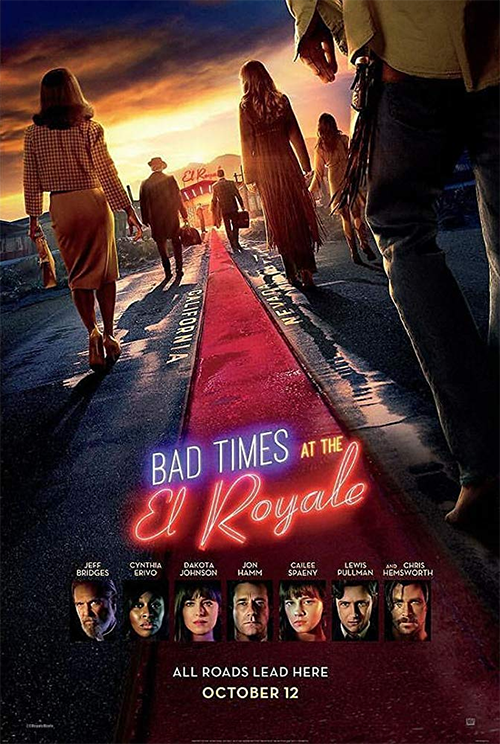 Riveting and expertly constructed, this sophomore effort of writer-director Drew Goddard features the same blazing confidence in style and form as his imaginatively go-for-broke debut feature, 2012's "The Cabin in the Woods." A sizzling neo-noir cousin of 2003's "Identity" and 2015's "The Hateful Eight," the film sidesteps the cookie-cutter in exciting ways; as the narrative unravels, it is near-impossible to predict where things are going. At a time in major studio filmmaking when branding is everything and commercial properties—from comic-book movies to established franchises and sequels—are paramount, it is something of a minor miracle the enthrallingly original and multilayered "Bad Times at the El Royale" has seen the light of day. A deliberately woven tapestry deliciously toying in different tones and genres, the picture marches to the beat of its own deviously methodical drummer. At once vicious and darkly funny, cold-blooded and feelingly humane, this musically inclined corkscrew thriller looks the part, feels the part, and most definitely sounds the part; the classic '60s soundtrack brings yet another soulfully textured element to its haunting cauldron. In one of the year's top breakthrough performances, Cynthia Erivo (2016 Tony winner for "The Color Purple") astonishes. The intensity, depth and nuance she brings to Darlene Sweet, a young black woman who has struggled to make it in the music business under the thumb of misogynistic, power-hungry men, is matched only by her rapturous voice. Above all, the film's luminous effect resonates and lingers long after it has ended, subtly but surely connecting the past to the present-day era's incendiary, cult-like political landscape and long-overdue cultural "Me Too" movement in a way that makes it rousingly, urgently timely. In years to come, "Bad Times at the El Royale" is destined to find the audience it never quite did in theaters.

"The Strangers: Prey at Night," directed by Johannes Roberts, was written off almost immediately upon release as an inferior, long-in-the-tooth sequel to 2008's sensational—and sensationally terrifying—home-invasion thriller "The Strangers." Look again. 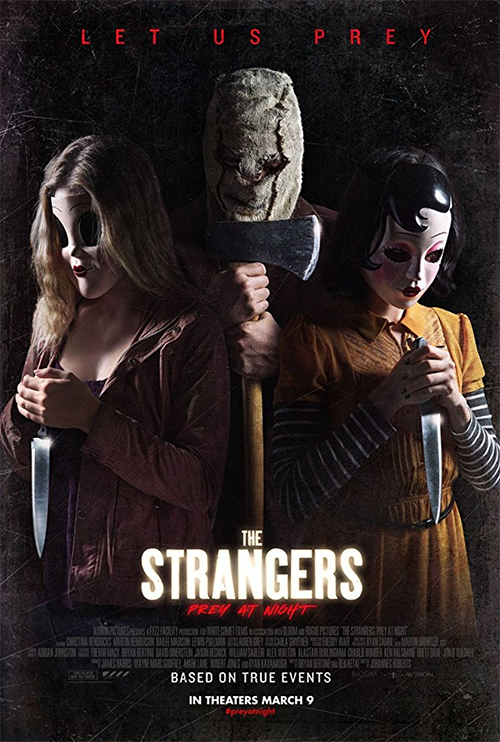 Just like its predecessor's writer-director Bryan Bertino before him, every beat of returning scribe Bertino and director Johannes Roberts' just-as-potent follow-up is saturated in his adoration and reverence for horror's legacy. Paying welcome tribute to certain iconic beats from the original while bravely forging its own path, the picture—pitting a family in crisis against a trio of masked psychopaths at a near-deserted trailer-park resort—works as both a tremendously well-oiled exercise in jittery apprehension and a damn fine companion piece to what has come before. Not enough superlatives can be said about what Bailee Madison (as troubled teenage daughter Kinsey) does with this three-dimensional role; hers is a heroine of vulnerability and take-charge strength, of desperation and pangs of regret, of perceptive layers which gradually reveal themselves the longer the viewer follows her life-or-death struggle. Tech credits are top-notch, from cinematographer Ryan Samul's indelible imagery of lonesome, fog-steeped wide-open spaces to composer Adrian Johnston's exquisite '80s-style, John-Carpenter-inspired synth score. A handful of shrewdly used source cues (among them, Kim Wilde's "Kids in America" and "Cambodia," Bonnie Tyler's "Total Eclipse of the Heart," and Air Supply's "Making Love Out of Nothing at All") exhibit a wicked knack for incorporating sweeping '80s pop tunes into the fabric of its alarming goings-on. "The Strangers: Prey at Night" is beautifully moody and evocatively sinister, a crackerjack domestic-drama-turned-slasherama not easy to shake. Like "The Strangers" before it, the picture does what the best horror movies should: it leaves one rattled and on edge, but also euphoric, the piercing darkness of the film's content counterpoint to the thrill of experiencing a filmmaker achieving levels of greatness within a genre requiring a keen understanding and appreciation for its genus. An expert study in unnerving catharsis, the film astutely turns an involving familial slice-of-life into a harrowing but also exhilarating gift of fright.

 | The 15:17 to Paris
How could Clint Eastwood, director of such a gripping, authentically helmed docudrama as 2016's "Sully," make a film less than two years later as stilted, confused, meandering and altogether amateurish as "The 15:17 to Paris?" This true-story retelling of three American friends who thwarted an attempted August 2015 terrorist train attack while en route to Paris from Amsterdam goes wrong almost immediately and never fully recovers. Full of head-scratching, mind-boggling scenes so incessantly misguided and treacly one begins to question if he or she is hallucinating, the film brings precious little insight to the lives of its three heroic protagonists (playing themselves to varying degrees of success) and leaves one feeling more empty than inspired. Simply put, this is one of the most ill-advised biopics to grace screens in years.
|
 |
 | Blumhouse's Truth or Dare
A pedestrian children's-game variation on 2000's "Final Destination" and 2002's "The Ring," "Blumhouse's Truth or Dare" exhibits little of the inspiration one has come to expect from Jason Blum's frequently acclaimed company. Full of cheap jump scares, threadbare characterizations, and sterilized violence clinging to its PG-13 rating for dear life, the results prove hackneyed and, by the crummy, morally contemptible denouement, distastefully pessimistic. The truth of "Blumhouse's Truth or Dare" is that it's a lazily helmed, cheap-feeling trifle with no true scares and an off-putting cynicism coursing through its veins. The dare is to sit through all 100 minutes and not walk away feeling like you've totally wasted your time.
|
 |
 | Acrimony
Tyler Perry's dramatic work bringing 2010's "For Colored Girls" to life proved he had the ability to create a mature, thoughtful, classy-looking feature, so why does he so frequently helm movies that appear to have been thrown together over a long weekend? Wasting the ample talents of Taraji P. Henson, "Acrimony" fancies itself as a "Fatal Attraction"-esque thriller in the classic "...from Hell" subgenre, but instead plays like a mundane, style-free, hilariously overwrought soap opera. The yacht-set climax, like much of what has gone before, is inane in so many ways it's amazing the digital camera used to shoot the film didn't pop off the tripod and slink away in embarrassment. By never fully trying to understand Henson's mentally unstable Melinda beyond the irrational villainess she becomes, Tyler Perry lets her—and his lead actor—down to an almost irresponsible degree. Ultimately, by the end credits, the only acrimony left is from the bamboozled viewer.
|
 |
 | Tag
Just because "Tag" is inspired by a true story doesn't make it any less asinine. Unctuous, unfunny, and developmentally discombobulated to the extent it feels like a fever dream in retrospect, the film (based on Russell Adams' Wall Street Journal article "It Takes Planning, Caution to Avoid Being It") is 100 minutes of would-be rollicking nothingness. The central players—five middle-aged friends who have been engaging in an annual game of Tag during the month of May for thirty years and counting—are imbecilic and off-puttingly immature, and not at all in the child-at-heart way director Jeff Tomsic and screenwriters Rob McKittrick and Mark Steilen likely intend. The female characters, meanwhile, are too frequently sidelined and marginalized; this is a straight bro's world, and they're just living in it. "Tag" is anything but 'it', a nonsensical, mind-numbing race to nowhere.
|
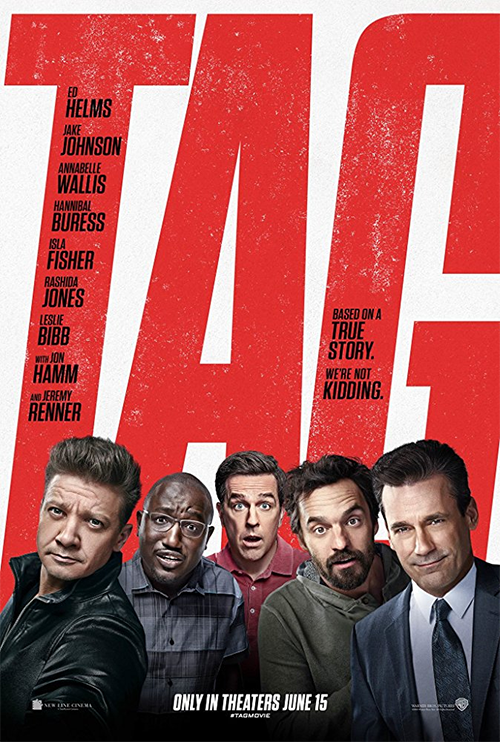 |
 | Death of a Nation
Documentaries are meant to educate and inform, not insult and deaden brain cells. "Death of a Nation," directed by Dinesh D'Souza and Bruce Schooley, is intellectually dishonest, morally hypocritical swill presupposing that the Democratic party of 2018 is no different than the Democratic party of 1860: full of racist, fascist, violent thieves who "want to steal our wealth and our earnings and our lives." Nuance-free and divorced from reality, the film dares to compare the beliefs of Adolf Hitler with those of Senators Elizabeth Warren and Bernie Sanders while painting President Donald Trump as a flag-waving savior whose every action is driven by his nationalistic love of America. "How do we fight the tyranny of the Left?" D'Souza asks as he wanders around city streets, lingering creepily outside the New York Times building. Queasy and repugnantly biased, conveniently overlooking the very real modern divides occurring in the U.S., the picture reminds again and again of the feature-length rantings of fear-mongering QAnon conspiracy theorists. Upon sitting and suffering through "Death of a Nation," I had a nightmare involving a nefarious mind-control takeover perpetrated by the Far Right. This may not have precisely been the propagandist filmmaker's intention, but, based on the evidence in this film, he wouldn't have a problem with such a horrifying dystopian scenario. In D'Souza's delusional eyes—and it's right there in the title—the country's demise, perpetrated by progressivism, is perilously nigh.
|
 |

 | Love, Simon
How is it that "Love, Simon" is likely the very first mainstream, wide-release studio release featuring a teenage lead character who happens to be gay? This shattered glass ceiling is a long time coming and, fortunately, the breakthrough film in question is more than worthy of carrying this proud torch. Sensitive and touching, gratifying and resoundingly honest, this big-screen adaptation of Becky Albertalli's acclaimed 2015 novel "Simon vs. the Homo Sapiens Agenda" gets just about every emotion right in its story of a 17-year-old boy navigating the tricky terrain of coming of age while coming into his sexuality. The care and affection director Greg Berlanti and scribes Elizabeth Berger & Isaac Aptaker bring to this material is unmistakable in every frame, and they are uplifted all the more with an excellent cast led by Nick Robinson as the title protagonist. The beauty of "Love, Simon" is in its astute, slice-of-life observances about family, friendship, and that delicate moment in every LGBTQ person's life when he or she must gather the courage to begin living as their authentic self. |
 |
 | Eighth Grade
Kayla (Elsie Fisher) is in the final stretch of her middle-school experience, and all she wants to do is make it through in one piece. An introverted 13-year-old girl socially awkward in her attempts to fit in, she isn't bullied so much as she is simply ignored by most of her peers. At home, she makes YouTube videos with slightly more confidence, aiming to spread inspiration to viewers on topics affecting adolescents in her age range, but really just hoping her words might have a positive effect on herself. The accomplished writing-directing debut of actor-musician Bo Burnham, "Eighth Grade" is a stirring, painfully accurate slice-of-life, the kind of film so authentically observed it sometimes feels more like a cinéma vérité documentary than a scripted feature film. Selling this illusion all the more is Elsie Fisher, whose past credits (including voicing Agnes in 2010's "Despicable Me" and 2013's "Despicable Me 2") were clearly appetizer for the breakthrough lead performance she delivers here. She is nothing short of magnificent in a demanding, front-and-center role requiring significant layers of vulnerability and courage. It is no secret one's middle-school years are typically miserable, and "Eighth Grade" captures this precarious period with impeccable, aching authenticity. |
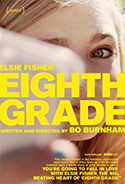 |
 | First Reformed
Reverend Ernst Toller (Ethan Hawke in a career-best performance) isn't experiencing a religious crisis of faith; it is his faith in man which is severely in decline. A priest leading a sparse congregation at the First Reformed church in the sleepy upstate burg of Snowbridge, New York, he sees hypocrisy in his colleagues at nearby megachurch Abundant Life and in a population seemingly unfeeling and dismissive of the planet's ailments. Crystallizing his increasing distaste is the daily reminder of his own mortality; he struggles to find reason behind the death of his grown military son, killed in the Iraq War, and he faces a worrisome illness about which he's long overdue for a medical diagnosis and treatment. Baroquely designed, restlessly written and directed by Paul Schrader, "First Reformed" is an intensely focused character study with the chugging verve and apprehension of a thriller. At the onset, the viewer is left off-balance, unsure of where things are going and what Schrader's intentions are. Is he making an anti-religion polemic? A call to arms for a more caring, empathetic modern reality? By the end, his sharply unexpected destination brings things into focus. Getting there is pleasurably, seamlessly, internally provocative, an emotionally challenging tale of a lost soul who has made the choice to shut out the very human connections in which he most desperately needs. Gripping in its unsentimental clarity of vision, startling in its portentous ruminations on belief, sacrifice, and nature, "First Reformed" is unsparing even as it spares, a cinematic jolt of agony and transcendence. |
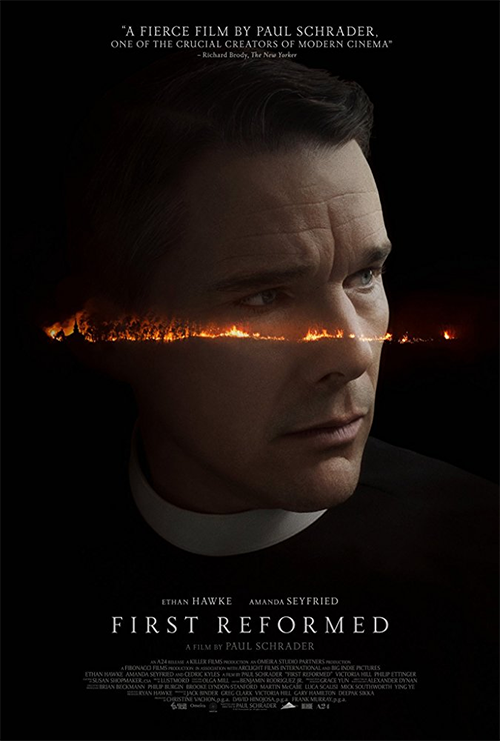 |
 | Lean on Pete
The eponymous character is an aging thoroughbred whose days of winning on the racetrack are becoming fewer and farther between, but it is his friend and companion—a 15-year-old latchkey kid named Charley (Charlie Plummer, an emotionally raw revelation)—who guides "Lean on Pete" through a narrative of stark, bristling beauty. At first glance, the film—based on the 2010 novel by Willy Vlautin—appears to be a boy-and-his-horse story, a bittersweet saga fit for the whole family. In reality, it is an altogether darker drama, one which sends this pair on an eye-opening, sometimes harrowing odyssey across the Pacific Northwest. Writer-director Andrew Haigh has made a tough, touching, marvelously observant picture, one which consistently reinvents itself over a two-hour running time of hardscrabble humanity and yearning solace. Tough to take but impossible to turn away from, "Lean on Pete" is unforgiving until, at long last, it isn't, an indelible, remarkably moving glimpse into the margins of American life as seen from the point of view of a boy in search of a safe place to call home. |
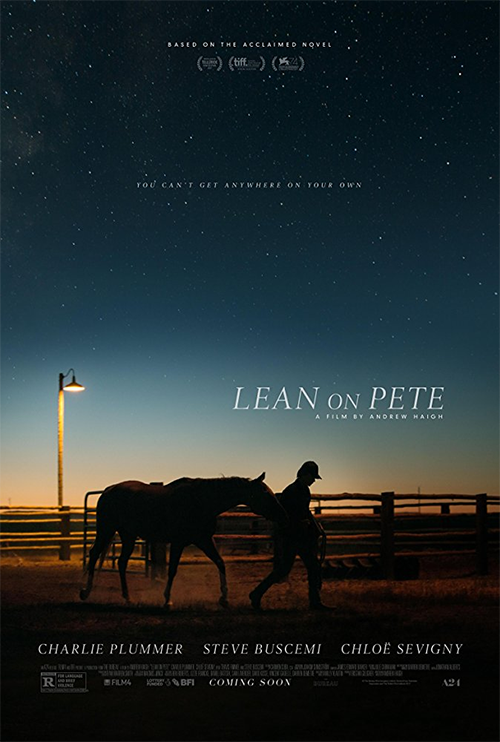 |
 | Won't You Be My Neighbor?
Grace. Humility. Kindness. Understanding. Fred Rogers embodied each of these attributes even when the world around him didn't always follow suit. At a time when there is so much uncertainty, fear, bigotry and turmoil happening around us, a sublimely humane documentary like "Won't You Be My Neighbor?" is needed more than ever. In exploring Rogers' life and his thirty-plus years hosting PBS children's series "Mr. Rogers' Neighborhood," director Morgan Neville reminds us love and goodness will overcome hatred and cruelty every time. Rogers had an innate ability to level with children about their everyday feelings and real-world troubles (or, as he described it in a 1967 interview, to "help children through some of the difficult modulations of life"), and he did so without ever talking down to them. Through his life's valiant work, he sought to open minds and lead by example. "Those that make you feel lesser than you are—I think that's the greatest evil," Fred Rogers says during an archival interview late in the picture. His words resonate, not only because of the wisdom behind them, but because they are as relevant today as they've ever been. "Won't You Be My Neighbor?" is poignant, uplifting and desperately needed right about now, a compassionate embrace in filmic form. |
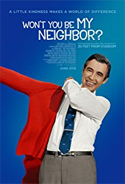 |
 | Annihilation
Superficially, "Annihilation" may look from the outside like yet another derivative facsimile of Ridley Scott's "Alien," a science-fiction thriller where a group of astronauts/soldiers/scientists venture into the unknown—in this case, an ever-expanding, unexplainable disaster zone within the Florida Everglades known as The Shimmer—and are picked off one at a time by a deadly unidentified force or creature. Writer-director Alex Garland does not deal in mimicking what has come before. Thus, while the nuts-and-bolts premise sounds like the set-up for the familiar, what viewers are treated to instead is altogether fresh and mesmerizing and thoroughly unshakeable, a quaking, thought-provoking story of grief, lost loves, unearthly metamorphoses, and the delicate yet all-powerful cellular make-up which connects everything in the world—for better and for worse. Natalie Portman is tremendous as Lena, a biologist and Johns Hopkins professor who decides to join this potential suicide mission. The deeper one digs into the picture's shuddersome, biologically interconnected pleasures, the more momentous it feels. Beyond the realm of what one could envision for the planet's future yet eerily plausible all the same, the film expertly builds a skewed fictional reality before reaching a harrowing conclusion impossible to predict. In spite of its title, "Annihilation" isn't just about the end of things, but also about the beginning of something else—an insinuation of profound and portentous consequence. |
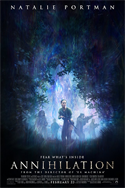 |
 | Boy Erased
"Boy Erased" is an important film, and also a wise one, shedding crucial light on deeply damaging gay conversion therapy programs and the struggle for acceptance of LGBTQ youths within heavily religious families and across the too often close-minded, unenlightened Bible Belt. Writer-director Joel Edgerton, adapting Garrard Conley's book "Boy Erased: A Memoir," is careful not to demonize or paint with broad strokes, finding tortured humanity beneath surfaces of bigotry, fear, and blind evangelical belief. His film is harrowing, even enraging, but there is a greater purpose and an ultimate sense of hope that may, in its last transcendent moments, take one's breath away. Lucas Hedges is superlatively cast as the conflicted, teenaged Jared, his initial desire to change for his parents transforming into desperation, resentment, and then acceptance. Every note Hedges strikes is honest and searing, leading toward a pair of scenes—one with his mother (Nicole Kidman), the other his father (Russell Crowe)—that rank as two of the most indelibly written and performed of the year. "Boy Erased" is an exceptionally moving, beautifully modulated film, hopefully eye-opening for those whose eyes have been closed for far too long. |
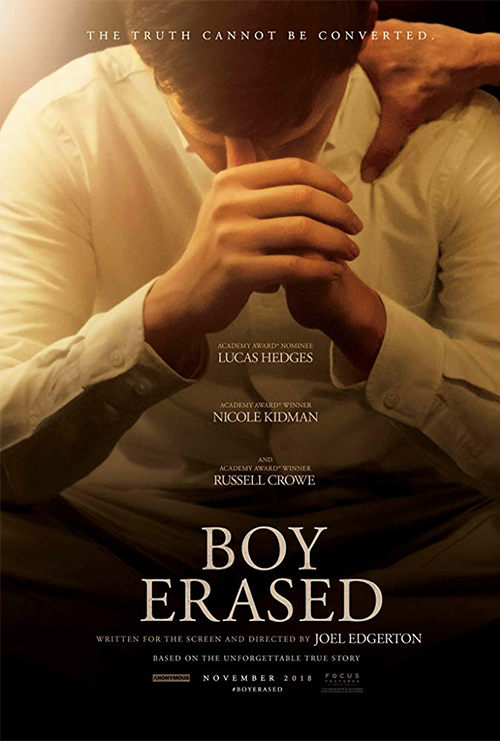 |
 | Suspiria
"Suspiria" is a sustained death rattle in dread-inducing cinematic form, a tale of thematically loaded suggestion and ominous fate, of deep-seated guilt and haunting premonition. Seeing it once isn't nearly enough. Seeing it twice only allows one to begin to unpack the formidable ambition of director Luca Guadagnino's expansive ideas. While he does not achieve the brooding kaleidoscopic scares Dario Argento concocted in the one-of-a-kind, phantasmagoric 1977 film upon which this one is based, he also rarely seems to be striving for them; exploring the harrowing journey of Ohio transplant Susie Bannion (Dakota Johnson) into a lauded Berlin dance company run by witches, his film is more existentially disturbing, more concerned with taking the shell of the fast-paced, 98-minute original film and expanding it into a contemplative, grimly ravishing 152-minute psychodrama, a metaphor for Germany's harrowing past operatically writ large. By breaking new fertile ground and not merely reenacting Argento's untouchable beats, Guadagnino has crafted a bewitching triumph all his own, a showcase for his fiercely individualistic sensibilities. Ferociously mortal wails of both literal and emblematic intent culminating in final moments tinged with bittersweet empathy, "Suspiria" remarkably defies expectations—in the best way—from beginning to end. This is a motion picture burrowing into the cold heart of darkness and finding within it a spark of humanity which can never be extinguished. |
 |
 | Roma
If the most epic stories are oftentimes the most intimate and human—the ones which barrel straight into the messy, miraculous heart of existence—then "Roma" arrives as an awestruck cinematic miracle. Inspired by writer-director Alfonso Cuarón's reminiscences from childhood and dedicated to the real-life nanny, Liboria "Libo" Rodríguez, who helped to raise him, the film is saturated in all of the beauty, the heartache, and the mystery life has to offer. In an astonishing debut performance of unaffected, lived-in verisimilitude, newcomer Yalitza Aparicio grabs the viewer's heart without asking for it as Cleo, a young domestic worker living in the Roma neighborhood of Mexico City in 1970. Luminously photographing in galvanizing, sharp-contrast 65mm black-and-white, the filmmaker behind such science-fiction groundbreakers as 2006's "Children of Men" and 2013's "Gravity" has accomplished his most personal, earthbound work to date. Adopting a naturalistic, semi-improvised approach while outdoing itself time and again with the sheer profundity of its imagery and the unvarnished emotions of its characters, "Roma" plays like poetry in motion. |
 |
 | Hereditary
It usually takes the passage of time for a film to widely attain the moniker of "classic," years in which to grow in esteem and influence while carving out an enduring legacy for itself within both its respective genre and the cinematic landscape as a whole. Like some of the very best, though, "Hereditary" doesn't need years. All it needs is the two hours it takes to watch it and walk away feeling not only rattled to one's core but somehow changed. This galvanizing writing-directing debut by Ari Aster is not only one of the truest, most wrenching explorations of a family in crisis ever brought to the screen, it fast cements itself as a watermark in horror. Toni Collette, in a towering performance of harrowing, full-throated devastation, portrays the matriarch of the Graham family, a miniature artist up against tight deadlines while struggling to come to terms with the passing of her semi-estranged mother. Upon first viewing, "Hereditary" offers the icily sinister pleasure of discovery, a macabre specter's touch which lingers long after the credits have rolled and one begins to ruminate on the film's despairing tornado of events. In retrospect, the picture thrillingly deepens all the more, its portentous clues spread like breadcrumbs leading methodically into the clutches of evil. At its center is the Graham family, caught in the cogs of a malevolent destiny they neither anticipate nor understand. Capable of breaking one's heart and chilling the viewer to the bone, the film transcends genre altogether, reaching ecstatic heights of pure cinema. To experience "Hereditary" is to sense something monumental being born, a quaking, foreboding, tragically humane tour de force penetrating itself squarely into the epicenter of darkness. |
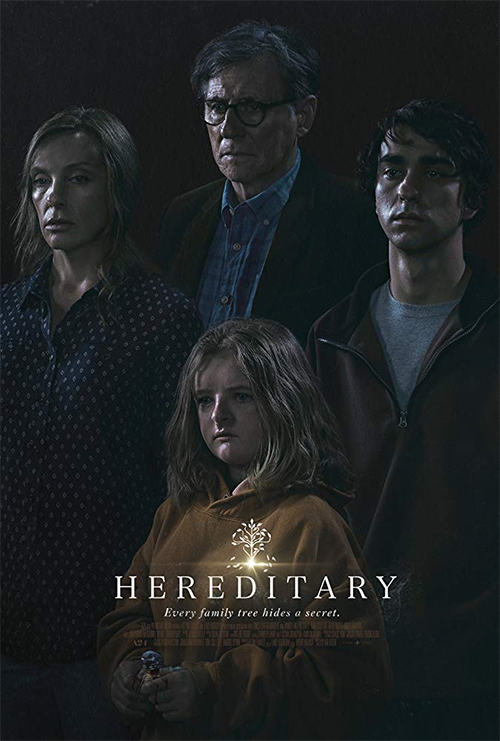 |
|
© 2018 by Dustin Putman
 |
|
|
|